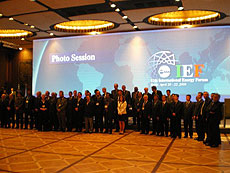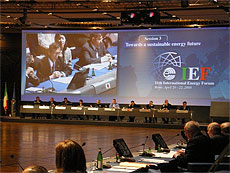Remarks by Mr. Masakatsu KOIKE
Vice Minister for Foreign Affairs of Japan
at Session 3 "Towards a Sustainable Energy Future"
in 11th International Energy Forum
22 April 2008, Rome


In order for any economies to realize economic development and improve their living standards, it is essential to secure stable energy supply. Currently, approximately 2.5 billion people in developing countries are not able to have access to modern energy services. Securing energy access for those people would be the global-scale challenge that should be tackled immediately.
On the other hand, the world energy demand has been expected to increase significantly being led by developing countries, particularly in Asia.
So, in near future, more people are to have access to energy, and much larger energy demand is to occur for their economic growth.
In these circumstances, improvement of energy efficiency and diversification of energy sources must play a great role in easing the tight balance of energy supply and demand. In addition, efficient use of energy and diversification of energy sources should be considered from the point of preventing the increase of CO2 emission as well. Addressing energy issues and tackling climate change are indispensably linked to each other.
Therefore, while it is very important in the short- to mid-term to deploy energy efficient technologies which are currently available in developing countries, in the long-term we have to accelerate the development of new and innovative technologies. To that end, we should not just vaguely entrust individual efforts, but facilitate global cooperation under shared policies and strategies.
With a view to ensuring the sustainable development of developing countries, Japan has been providing assistance through mainly ODA for securing stable energy supply for them, taking into account the different situation of each country.
Japan has made efforts to implement anti-poverty measures through provision of modern energy services and to help develop industry through securing a stable supply of required electricity.
At the same time, it also actively puts forward cooperation in the energy sector which has positive effect on environment. This includes, for example, providing energy-related infrastructure with reduced energy loss and more efficient use of energy, and establishing zero CO2 emission power generation facilities which utilize renewable energy including hydro, geothermal, and photovoltaic energy.
This IEF meeting will make it clear that both producing and consuming countries share a common goal, that is, securing access to clean, affordable and safe sources of energy to maintain global economic growth while protecting the environment. I would support this message as strongly as possible. As a host of G8 Hokkaido Toyako Summit, Japan will actively contribute to mitigating energy poverty and addressing climate change issues.
Back to Index
